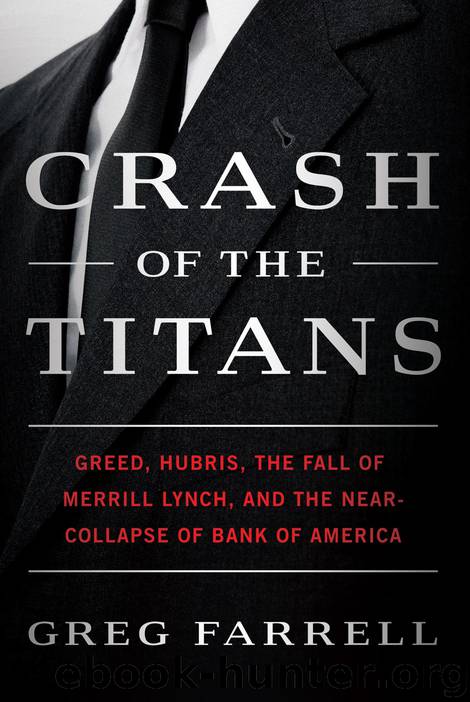Crash of the Titans by Greg Farrell

Author:Greg Farrell [Farrell, Greg]
Language: eng
Format: epub
ISBN: 978-0-307-71788-7
Publisher: Crown Publishing Group
Published: 2010-11-01T16:00:00+00:00
LEHMAN WAS NOT SCHEDULED to announce its third-quarter earnings until midmonth, but the loss of confidence in the marketplace forced Fuld and his top managers to rush out their earnings announcement early Wednesday, in order to remove an overhanging uncertainty that would surely build up in the days ahead. The bank announced a loss of $3.9 billion, driven largely by a write-down of $7.8 billion on real estate–related assets.
Late Wednesday, September 10, after the markets closed, Lehman CEO Dick Fuld announced a plan to spin off Lehman’s problematic loans into a separate “bad bank,” akin to what Tosi had suggested to O’Neal a year earlier. Although the idea made sense on paper, it was similar to other proposals floated by companies such as Citigroup earlier in the year, and like the Citigroup proposals, it didn’t strike investors as credible.
The next day, Lehman’s stock endured another precipitous fall, opening up almost $3 down from where it had closed the day before. More than 473 million shares traded hands that day and the stock closed at $4.22. The company was well into the red zone now and everyone on Wall Street knew that Lehman would not be able to survive as an independent entity, if it survived at all. The ending would be bad and would have to take place over the weekend. The only question was, how bad?
On Thursday and Friday, Thain and Fleming attended a special board meeting called by Larry Fink of BlackRock, held at the St. Regis Hotel in Midtown. Like everyone who worked in the financial services industry, Fink was following the Lehman news closely, and more than most, he was acutely aware of how closely Lehman’s fate was intertwined with Merrill’s.
To Fink, both Thain and Fleming appeared distracted during the two-day retreat, each man immersed in frequent conversations on his cell phone. Thain called Paulson again, to reiterate his offer of helping out with any government-sponsored initiative to prop up the failing bank. Paulson told him that there would probably be some kind of meeting that weekend, along the lines of what transpired a decade earlier with Long Term Capital Management.
Fleming was not aware of Thain’s attempts to get information or direction from Paulson. Instead, he grew ever more frustrated at his boss’s preternatural sense of calm in the face of impending disaster. Thain consistently brushed off Fleming’s recommendation that he call Ken Lewis at Bank of America. It was now apparent that BofA was combing over Lehman’s books, exploring the possibility of an acquisition on the cheap, an acquisition which, if it took place, would eliminate the one concrete possibility Merrill had for saving itself in an emergency.
Between boardroom sessions, Fleming spied an opportunity to speak to Fink privately, away from Thain and other attendees, and approached.
“Are there any circumstances under which you would consider acquiring Merrill Lynch?” Fleming asked.
Fink paused to let the question sink in. “Maybe,” he answered, “at $11 per share.” At the time, Merrill shares were trading at twice that price, although trending downwards.
Download
This site does not store any files on its server. We only index and link to content provided by other sites. Please contact the content providers to delete copyright contents if any and email us, we'll remove relevant links or contents immediately.
International Integration of the Brazilian Economy by Elias C. Grivoyannis(111061)
The Radium Girls by Kate Moore(12029)
Turbulence by E. J. Noyes(8052)
Nudge - Improving Decisions about Health, Wealth, and Happiness by Thaler Sunstein(7709)
The Black Swan by Nassim Nicholas Taleb(7130)
Rich Dad Poor Dad by Robert T. Kiyosaki(6637)
Pioneering Portfolio Management by David F. Swensen(6301)
Man-made Catastrophes and Risk Information Concealment by Dmitry Chernov & Didier Sornette(6019)
Zero to One by Peter Thiel(5802)
Secrecy World by Jake Bernstein(4753)
Millionaire: The Philanderer, Gambler, and Duelist Who Invented Modern Finance by Janet Gleeson(4479)
The Age of Surveillance Capitalism by Shoshana Zuboff(4293)
Skin in the Game by Nassim Nicholas Taleb(4250)
The Money Culture by Michael Lewis(4207)
Bullshit Jobs by David Graeber(4192)
Skin in the Game: Hidden Asymmetries in Daily Life by Nassim Nicholas Taleb(4007)
The Dhandho Investor by Mohnish Pabrai(3766)
The Wisdom of Finance by Mihir Desai(3748)
Blockchain Basics by Daniel Drescher(3583)
